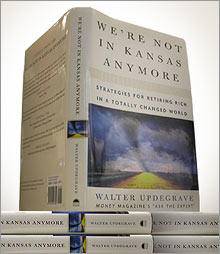|
|

|
|
More information on Updegrave's new book.
|
|
|
|
|
|
|
NEW YORK (CNN/Money) -
Back in Home Economics class I remember we were given a guide that told us what percent of our income should go toward various expenses (mortgage, insurance, food, transportation, etc.) Where can I find something similar today?
-- Sharon, Las Vegas
I think the nearest thing to what you're looking for is the Consumer Expenditure Survey, which is a study of the spending and saving habits of more than 100,000 consumers conducted by the Department of Labor's Bureau of Labor Statistics.
Essentially, researchers start with average income before taxes for all American consumers, and then list in actual dollars the average expenditures for everything from food at home, away from home, alcoholic beverages, housing expenses, utilities, transportation, health care -- even spending for clothing and entertainment.
The survey doesn't show these spending categories as a percentage of income, but it's pretty easy to do that yourself with a pencil, paper and calculator or, if you want to get a bit fancier, to plug the info into an Excel spreadsheet. By doing this, you'll at least get a sense of how your spending overall and in different areas compares against that of the average American.
Get into the details
But you can actually do somewhat better than that. How? Well, the BLS also massages the numbers so that you can see the spending patters of particular types of consumers.
So, for example, if you're a homeowner and want to see how your housing expenditures compares with that of other homeowners rather than renters, then you can pull up the version of the survey that presents the figures by the type of housing one lives in. Or you can look at the spending stats for different income groups, or by ethnicity or race. Or age. Or even by education.
The real issue, though, is where does this get you? I suppose if you just want to get an idea of whether your spending patterns are similar to those of the average American -- or average educated American or high-income American or whatever -- that's fine. Maybe even of some small interest.
Figure out what's right for you
But I think it's more important that you arrive at the level of spending and saving that's right for given your values and your priorities. Does it really matter whether you spend more on entertainment and less on transportation than your fellow Americans? I don't think so.
What really matters is that you tailor your overall spending to your particular finances. And by that I mean that you spend enough to have a decent standard of living today, but also put away enough money on a regular basis so that you'll be able to provide a decent standard of living for yourself in retirement as well.
If comparing you spending to the stats in the Consumer Expenditures Survey helps you do that, that's great. Or if running budgeting software helps you get a handle on your spending and saving, then I say boot it up, man.
The Two Line budget
Me, personally, I'm a proponent of what I like to call the Two Line Budget. On the first line you enter how much you make. On the second you enter the percentage of your salary you would like to save -- say, 5 to 10 percent initially, more later -- and that's it.
You save that 5 or 10 percent from each paycheck and the remaining 90 percent to 95 percent will take care of itself. The important thing is that you learn to live below your means today so you can have a decent standard of living in the future. (For more on the rationale behind this approach, click here.)
Besides, if you were paying attention at all in Home Ec class, I'm sure you picked up enough skills that you'll have no trouble finding clever ways to stretch that 90 to 95 percent of your remaining income so that you never even miss what you've saved.
Walter Updegrave is a senior editor at MONEY Magazine and is the author of "We're Not in Kansas Anymore: Strategies for Retiring Rich in a Totally Changed World."

|